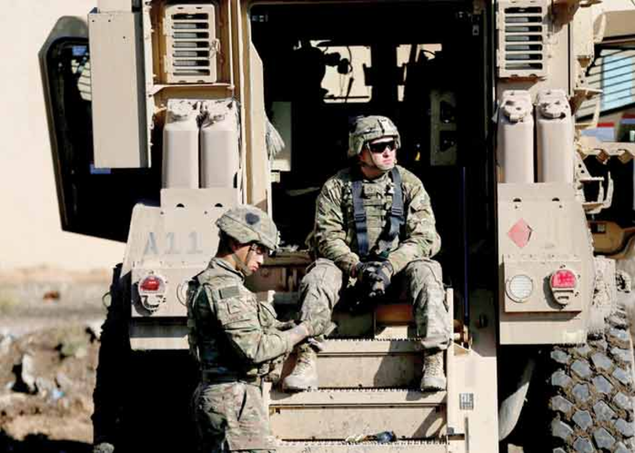The operation to dislodge the Islamic State (ISIS) from Mosul has proven to be a lengthy and fierce fight. After the city is won back, Iraqi security forces and allied militia must control areas within the upper Euphrates basin: Ana, Rawa, al-Qaim and Badia as well as towns straddling the Iraqi-Syrian border.
Behind scenes of devastation and needless civilian losses is an ever-more disquieting reality: The steady expansion of US military bases and personnel.
During a speech in May, Iraqi Prime Minister Haider al-Abadi affirmed that “we only have US advisers and military trainers. There are no military bases or armoured vehicles. Those you see may be those seen along the Turkish-Syrian border.”
Iraqi Shia politician Mowaffak al-Rubaie conceded that the United States has 20,000 troops and six military bases rooted in Iraq. “Anyone who claims otherwise can talk to me,” he said. “It is impossible to predict what America wants” since the Trump administration has proven “temperamental” with no clear vision, said Rubaie.
Matthew Hoh, tasked with reconstruction in several Iraqi provinces during the American occupation, said “we have no reliable figures” to determine the true size of stationed combat forces. “The American military is not even giving specific numbers. They’re giving more whole or approximate figures,” Hoh said.
Throwing greater light on the United States’ game plan is an Iraqi contractor who drew a map to explain the expansion of US bases around contested north-western territories. The fringe of Iraq’s western border — that stretches from Erbil to Trebil — as he depicted, is sealed off by US bases. The aim of which, he said, was to secure “the biggest prize of all: The Baghdad-Amman highway,” cutting through Iraq’s Sunni heartland, through Ramadi and Falluja.
The road has been the site of unforgiving attacks on civilian trucks, borne out by the United States’ failure to distinguish between those carrying commercial cargoes and those used by insurgents.
US plans to privatise the highway are under way. The Iraqi government has locked itself into a 25-year contract with Olive Group, the sole sponsor of what will become Iraq’s first toll road. The private security firm will handle toll road authority, collecting charges to cover debts incurred by the redevelopment project.
Abadi heralds the move an investment, alluding to efforts intended to tame bandits and militia outfits policing highways and extorting cash from highway travellers.
The reinsertion of private security firms in Iraq, in the minds of many, will be recognised as another occupation, mirroring the flood of security contractors invited to perform national security functions in 2003.
As a supply chain through which reconstruction materials and funds will pass, highway protection is vital to US interests. The risk felt by anti-American militias in Iraq is the reassertion of US political control in Sunni provinces as brokers of power rewarding allies and punishing rivals.
The expansion of US bases and the deployment of contractors to secure military bases will hardly ward off terrorists or insurgent factions. Above all else, renewed military commitment signals occupation: Phase II, and, as Hoh puts it, communicates to Iraqis “that Americans are really fine with no reconciliation.”
“You’re going to continue to see billions of dollars in arms sales to the Iraqi governmen,” Hoh said. “Bases will go forward… We’ll see false promises to rebuild, but no real money behind it — nothing real or significant.”
Source: www.thearabweekly.com/Opinion/8571/Scepticism-surrounds-America%E2%80%99s-designs-in-Iraq-after-Mosul


 RSS Feed
RSS Feed